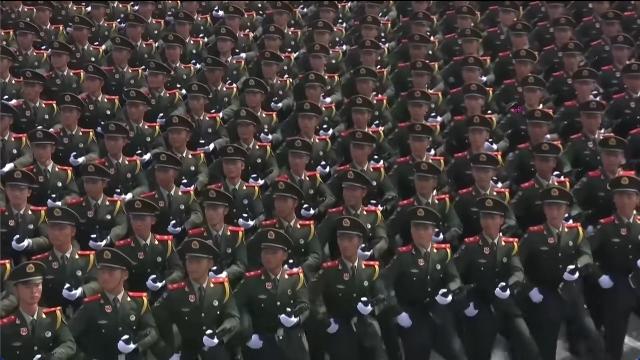Is the Chinese military a Potemkin village?
I want to direct your attention to a Joe Cunningham essay in which he posits that the Chinese military is in trouble. He’s almost certainly right. The problem with communism is that it reduces societies to the lowest common denominator of any behavior and, as people scrabble for advancement in a controlled system, it invites corruption.
Writing at Red State, Cunningham points out purges and problems regarding China’s military:
The Chinese President is calling for “deep reflection” among his military forces as he renews his focus on corruption, which has plagued China in recent months. His call comes after what the Wall Street Journal describes as a “purge that has brought down more than a dozen senior generals and defense-industry executives.”
Recently, Xi was embarrassed to find that missiles were filled with water rather than fuel, with officials pocketing the money meant to make the missiles fly.
Just today, the Wall Street Journal was back with more news about China’s military problems. The story is behind the Journal’s paywall, but the first paragraph tells you a lot:
Chinese leader Xi Jinping ordered a redoubled campaign to eradicate graft and enforce loyalty in the military, suggesting no end to a purge in the country’s defense establishment that has raised questions about Beijing’s ability to wage war.
In his speech to top military officials, Xi pointed to problems with discipline, ethics, ideology, and moral character, all of which are permeating the military.
I agree with Cunningham that Xi’s concerns reflect a real issue rather than being a communist chief’s periodic reminder to the military about who’s in charge and the fate that can befall those who run afoul of him. No doubt they all know that, in 2016, Kim Jong-un executed two of his senior officials using anti-aircraft guns. Despots don’t like being made to look bad.
Here are my three reasons for believing Xi isn’t just posturing but is actually worried:

Image: A Chinese military parade. YouTube screen grab.
1. China’s former one-child policy, which resulted in a huge surplus of males, also resulted in a surplus of weak men coddled by their families. These children, who came to be known as “little emperors,” are risk-averse and non-competitive, and the young men are neurotic.
In other words, even though China still recognizes the sex binary, it has its own version of the soy-boy personality in its society, and that’s going to affect its military.
2. Communism breeds corruption. As we see in America’s institutions—everything from the government to our own military to academia—merit is no longer a factor in advancement. Instead, ideological correctness is the primary consideration in leftist systems. However, a system dominated by the ideologically pure rather than the competent inevitably collapses under its own weight. The mission gives way to in-fighting and profiteering.
What’s happening to the Chinese military now is a foretaste of the imminent collapse of our own institutions unless they’re put back on a merit track.
3. Communism breeds substandard quality. When merit has no reward, people do substandard work. We see that in every product that comes out of China. The artisans, craftsmen, and small farmers who once labored to produce the best for their own pleasure and economic benefit have been wiped out in a country that’s one giant factory assembly line. You do enough to get by and not one iota more. Chinese equipment looks great, but it’s still built in Chinese factories.
Again, we’re seeing this across America. There is no room for an individual’s pride in his work when he is a widget in a state-focused rather than an individual-focused system.
While any military, of necessity, cannot have too much individualism, the best militaries are still made up of people who see themselves as having individual value and who take pride in whatever they do. China’s little emperors cannot be those people.
None of this, of course, means that the Chinese military isn’t a force to be reckoned with. It’s huge, meaning that, as was the case with the Soviet Union after the Nazis invaded, it has enough bodies to absorb whatever its enemy throws at it and still come back with more troops. The Nazis were the better fighting force, but the combination of a limitless Red Army and a cold winter defeated them on their Eastern front.
Still, Xi does have a problem. He can fix it for a while through the coercion of fear. However, eventually, even fear is an insufficient glue to hold together an inherently unstable system.
FOLLOW US ON
Recent Articles
- New York Greenlights Quarantine Camps
- Reality Check for Democrats
- A MAGA Siege of the Democrats’ Deep State
- Why Incel and 4B Culture Matter
- Defending Donald Trump: A Response to Jeffrey Goldberg and The Atlantic on the Signal Leak
- Are Judges Complicit in Lawfare?
- Deep Dive: The Signal Chat Leak
- Mark Steyn’s Reversal of Fortune
- Where We Need Musk’s Chainsaw the Most
- Trump Is Not Destroying the Constitution, but Restoring It
Blog Posts
- A Ph.D. in ‘Molecular and Cell Biology’ shows the difference between credentials and knowledge
- Nasty Venezuelan migrant who flashed taxpayer dollars and urged squatting, gets thrown out
- Watch white leftist women’s brains breaking—and repairing—in real-time
- The last, best hope ...
- In Pennsylvania, are Democrats stealing votes again?
- Knife control comes to the U.K.: Prime Minister Starmer bans Ninja swords
- This Tuesday, Wisconsonites must vote for Brad Schimel for the State Supreme Court
- Was Vietnam worth the cost?
- Democrats should get a clue from the Palestinians who are now marching against Hamas
- Trump takes on Fauxahontas's brainchild
- Consumer Sentiment Survey: This too shall pass
- If they only had knife control....
- Newsom and Walz struggle to appear normal
- Anti-Trump lawfare: yes, it's a conspiracy
- Criminal attack? You're on your own.






